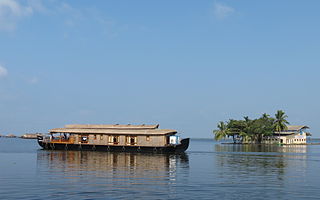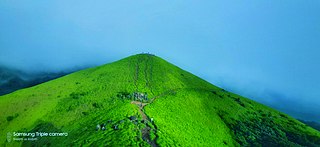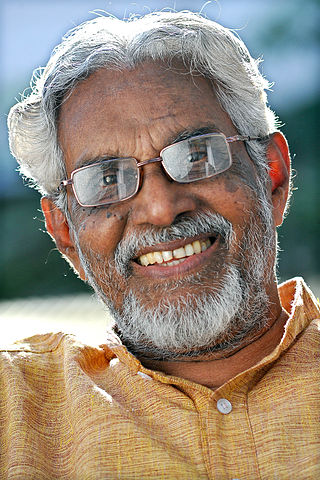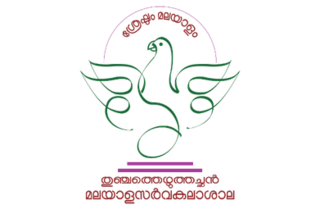Related Research Articles

Malayalam is a Dravidian language spoken in the Indian state of Kerala and the union territories of Lakshadweep and Puducherry by the Malayali people. It is one of 22 scheduled languages of India. Malayalam was designated a "Classical Language of India" in 2013. Malayalam has official language status in Kerala, Lakshadweep and Puducherry (Mahé), and is also the primary spoken language of Lakshadweep. Malayalam is spoken by 35 million people in India. Malayalam is also spoken by linguistic minorities in the neighbouring states; with a significant number of speakers in the Kodagu and Dakshina Kannada districts of Karnataka, and Kanyakumari, Coimbatore and Nilgiris district of Tamil Nadu. It is also spoken by the Malayali Diaspora worldwide, especially in the Persian Gulf countries, due to the large populations of Malayali expatriates there. They are a significant population in each city in India including Mumbai, Bengaluru, Chennai, Delhi, Hyderabad etc.

Malayalam, the lingua franca of the Indian state of Kerala and the union territories of Lakshadweep and Puduchery, is one of the six classical languages of India. Malayalam literature comprises those literary texts written in Malayalam, a South-Dravidian language spoken in the Indian state of Kerala. The first travelogue in any Indian language is the Malayalam Varthamanappusthakam, written by Paremmakkal Thoma Kathanar in 1785. Malayalam literature has been presented with 6 Jnanapith awards, the second-most for any Dravidian language and the third-highest for any Indian language.

Kasaragod is a municipal town and administrative headquarters of Kasaragod district in the state of Kerala, India. Established in 1966, Kasaragod was the first municipal town in the district. It is the northernmost district of Kerala and is also known as Sapta Bhasha Sangama Bhumi.

Cochin Jews are the oldest group of Jews in India, with roots that are claimed to date back to the time of King Solomon. The Cochin Jews settled in the Kingdom of Cochin in South India, now part of the present-day state of Kerala. As early as the 12th century, mention is made of the Jews in southern India by Benjamin of Tudela.

The Malayali people are a Dravidian ethnolinguistic group originating from the present-day state of Kerala & Union Territory of Lakshadweep in India, occupying its southwestern Malabar coast. They form the majority of the population in Kerala and Lakshadweep. They are predominantly native speakers of the Malayalam language, one of the six classical languages of India. The state of Kerala was created in 1956 through the States Reorganisation Act. Prior to that, since the 1800s existed the Kingdom of Travancore, the Kingdom of Cochin, Malabar District, and South Canara of the British India. The Malabar District was annexed by the British through the Third Mysore War (1790–92) from Tipu Sultan. Before that, the Malabar District was under various kingdoms including the Zamorins of Calicut, Kingdom of Tanur, Arakkal kingdom, Kolathunadu, Valluvanad, and Palakkad Rajas.

The culture of Kerala has developed over the past millennia, influences from other parts of India and abroad. It is defined by its antiquity and the organic continuity sustained by the Malayali people. Modern Kerala society took shape owing to migrations from different parts of India and abroad throughout Classical Antiquity.

Kerala, called Keralam in Malayalam, is a state on the Malabar Coast of India. It was formed on 1 November 1956, following the passage of the States Reorganisation Act, by combining Malayalam-speaking regions of the erstwhile regions of Cochin, Malabar, South Canara, and Travancore. Spread over 38,863 km2 (15,005 sq mi), Kerala is the 21st largest Indian state by area. It is bordered by Karnataka to the north and northeast, Tamil Nadu to the east and south, and the Lakshadweep Sea to the west. With 33 million inhabitants as per the 2011 census, Kerala is the 13th-largest Indian state by population. It is divided into 14 districts with the capital being Thiruvananthapuram. Malayalam is the most widely spoken language and is also the official language of the state.
Kerala Kaumudi is a Malayalam language daily newspaper published from Kerala, India, headquartered in the state capital, Thiruvananthapuram. It was founded in 1911 by C. V. Kunhiraman as a periodical. His son K. Sukumaran later served as the newspaper's editor. Kerala Kaumudi is one of the largest circulated newspapers in Malayalam with 9 editions, published from Thiruvananthapuram, Kollam, Alappuzha, Pathanamthitta, Kottayam, Kochi, Thrissur, Kozhikode and Kannur besides being circulated in the United Arab Emirates.
Vatteluttu or Vattezhuthu was an alphasyllabic writing system of south India and Sri Lanka used for writing the Tamil and Malayalam languages. This script is the sister of the Pallava script which once development in Southeast Asia.

Chandrika is an Indian daily newspaper in Malayalam language published from Kozhikode, Kerala. The newspaper currently serves as the mouthpiece of Indian Union Muslim League party in Kerala.

Kasaragod (pronounced[kaːsɐrɡoːɖɨ̆] is one of the 14 districts in the southern Indian state of Kerala. Its northern border Thalappady is located just 9 km south to Ullal, which is the southernmost portion of the major port city Mangalore, on the southwestern Malabar coast of India.

Arabi Malayalam is the traditional Dravidian language of the Mappila Muslim community. It is spoken by several thousand people, predominantly in the Malabar Coast of Kerala state, southern India. The form can be classified as a regional dialect in northern Kerala, or as a class or occupational dialect of the Mappila community. It can also be called a vernacular in general, or as a provincial patois, with the latter label being increasingly applicable in Colonial times. All the forms of the Malayalam language, including Mappila, are mutually intelligible.
Kolezhuthu, was a syllabic alphabet once used in Kerala for writing the Malayalam language.
Govt. High School (GHS) is a public school, located in Bangra Manjeshwar, Kasaragod District, Kerala State of India. This high school is affiliated to the Kerala State Education Board. This High School is listed as one of the SSLC examination centres by the Kerala Education Board. This school is one of the very few schools in Kerala that teaches in Kannada Language instead of Malayalam Language.
Karimpumannil Mathai George (1914–2002), popularly known as Dr. K. M. George, was an eminent Malayalam writer and educator. An erudite scholar and literary critic with astute organisational capabilities, he is best known as a pioneer of Comparative Indian Studies and Literatures. He was a recipient of the fourth highest Indian civilian honour, the Padma Shri, the highest literary award of the Government of Kerala, the Ezhuthachan Puraskaram and the third highest Indian civilian award, the Padma Bhushan, besides other honours.

Puthussery Ramachandran Pillai was an Indian poet of the Malayalam language. He was a scholar of Dravidian linguistics and a professor of Malayalam for more than three decades. On 14 March 2020, he died of age-related illnesses.

Thunchath Ezhuthachan Malayalam University, also called Malayalam University, is a state university in Tirur, Kerala, India.

The National Institute of Speech and Hearing (NISH) is an institute devoted to the education and rehabilitation of individuals with speech-language and hearing impairments located in Thiruvananthapuram, the capital city in the Indian state of Kerala. It was established in 1997 on the initiative of the state of Kerala and is a self-financing affiliate college of the University of Kerala. Academics at NISH is unique in the sense that NISH has an integrated campus where students with hearing impairment and students with normal hearing share the same campus. Bachelor's level courses exclusively for students with hearing impairment include Degree courses in Fine Arts, Computer Science and Commerce affiliated to University of Kerala. On the other hand, NISH also provides RCI approved professional courses at undergraduate level and graduate level in Audiology and Speech Language Pathology as well as diploma courses affiliated to Kerala Health University (KUHS)
K. V. Ramakrishnan is a Malayalam–language poet and journalist from Kerala state, South India. He received the Kerala Sahitya Akademi Award in the year 1997 for his work Akshara Vidya.
Kuttipuzha Krishna Pillai, was an Indian scholar, journalist, philosopher, atheist and critic of Malayalam language. Counted among the prominent literary critics of the language, he wrote a number of books covering the genres of literary criticism and philosophy. He presided over the Kerala Sahitya Akademi, chaired the advisory board of the Kerala Bhasha Institute as an ex-officio member and was a recipient of the Soviet Land Nehru Award.
References
- ↑ "Tribal Languages of Kerala" (PDF). languageinindia.com. Retrieved 1 August 2023.